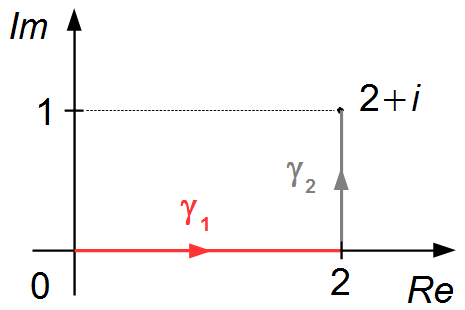Solved Problem on Contour Integration
advertisement
e) \( f(z)=y-x^{2} \), along the path formed by two segments, the first segment going from the origin to the point (2, 0), and the second segment going from the point (2, 0) to the point (2, 1).
The curve is formed by two segments γ1 and γ2, which must be parameterized separately.
The parameterization of a line is given by
\[
\begin{gather}
\bbox[#99CCFF,10px]
{z(t)=z_{1}+t(z_{2}-z_{1})}
\end{gather}
\]
- Parameterization of the γ1 curve (Figure 1)
Start and end points of the curve,
\( z_{1}=0+0i \)
and
\( z_{2}=2+0i \)
\[
\begin{gather}
z_{\gamma_{1}}(t)=(0+0i)+t[(2+0i)-(0+0i)]\\[5pt]
\qquad \qquad \qquad \qquad z_{\gamma _{1}}(t)=2t\qquad ,\qquad \ 0\leqslant t\leqslant 1 \tag{I}
\end{gather}
\]

- Derivative of zγ1(t) = 2t
\[
\begin{gather}
z'_{\gamma 1}(t)=\frac{dz_{\gamma 1}}{dt}=2 \tag{II}
\end{gather}
\]
The contour integral is given by
\[
\begin{gather}
\bbox[#99CCFF,10px]
{\int f(z)\;dz=\int f(z(t))z'(t)\;dt}
\end{gather}
\]
- Integration of f(z)=y−x2
\[
\begin{gather}
f(z)=y-x^{2} \tag{III}
\end{gather}
\]
Integration over the γ1 curve
\[
\begin{gather}
I_{1}=\int_{\gamma 1}f(z_{\gamma 1}(t))z'_{\gamma 1}(t)\;dt \tag{IV}
\end{gather}
\]
using expression (I) we have f(zγ1(t))
\[
\begin{gather}
z_{\gamma 1}(t)=\underbrace{\ 2t\ }_{x(t)}+\underbrace{\ 0\ }_{y(t)}i \tag{V}
\end{gather}
\]
substituting the values of x(t) and y(t) of expression (V) into expression (III)
\[
\begin{gather}
f(z_{\gamma 1}(t))=0-(2t)^{2}\\
f(z_{\gamma1}(t))=-4t^{2} \tag{VI}
\end{gather}
\]
substituting expressions (II) and (VI) into expression (IV)
\[
\begin{align}
I_{1} &=\int_{0}^{1}(-4t^{2})\times(2)\;dt=\int_{0}^{1}-8t^{2}\;dt=\\[5pt]
&=-8\int_{0}^{1}t^{2}\;dt=-8\times\left(\left.\frac{t^{3}}{3}\;\right|_{0}^{1}\right)=\\[5pt]
&=-8\times\left(\frac{1}{3}\right)=-{\frac{8}{3}} \tag{VII}
\end{align}
\]
- Parameterization of the γ2 curve (Figure 2)
Start and end points of the curve,
\( z_{2}=2+0i \)
and
\( z_{3}=2+i \)
\[
\begin{gather}
z_{\gamma_{2}}(t)=(2+0i)+t[(2+1i)-(2+0i)]\\[5pt]
z_{\gamma_{2}}(t)=2+t[2+1i-2]\\[5pt]
\qquad \qquad \qquad \qquad z_{\gamma_{2}}(t)=2+it\qquad ,\qquad 0\leqslant t\leqslant 1 \tag{VIII}
\end{gather}
\]

- Derivative of zγ2(t) = 2+it
\[
\begin{gather}
z'_{\gamma 2}(t)=\frac{dz}{dt}=i \tag{IX}
\end{gather}
\]
- Integration of f(z)=y−x2
\[
\begin{gather}
I_{2}=\int_{\gamma 2}f(z_{\gamma 2}(t))z'_{\gamma 2}(t)\;dt \tag{X}
\end{gather}
\]
using expression (VIII) we have f(zγ2(t))
\[
\begin{gather}
z_{\gamma 2}(t)=\underbrace{\ 2\ }_{x(t)}+\underbrace{\ t\ }_{y(t)}i \tag{XI}
\end{gather}
\]
substituting the values of x(t) and y(t) from expression (XI) into
expression (III)
\[
\begin{gather}
f(z_{\gamma 2}(t))=t-(2)^{2}\\
f(z_{\gamma 2}(t))=t-4 \tag{XII}
\end{gather}
\]
substituting expressions (IX) and (XII) into expression (X)
\[
\begin{align}
I_{2} &=\int_{0}^{1}(t-4)(i)\;dt=\int_{0}^{1}(it-4i)\;dt= \\[5pt]
&=i\int_{0}^{1}t\;dt-4i\int_{0}^{1}\;dt=i\left(\left.\frac{t^{2}}{2}\;\right|_{0}^{1}\right)-4i\left(\left.t\;\right|_{0}^{1}\right)=\\[5pt]
&=i\left(\frac{1}{2}\right)-4i(1)=\frac{1}{2}i-4i=\frac{i-8i}{2}=-{\frac{7}{2}i}\tag{XIII}
\end{align}
\]
The final result will be given by the sum of the integrals over the two segments (VII) and (XIII)
\[
\begin{gather}
I=I_{1}+I_{2}\\[5pt]
I=-{\frac{8}{3}}-\frac{7}{2}i\\[5pt]
I=\frac{-16-21i}{6}
\end{gather}
\]
\[
\begin{gather}
\bbox[#FFCCCC,10px]
{\int_{0}^{2+i}f(z)\;dz=-{\frac{16+21i}{6}}}
\end{gather}
\]
advertisement

Fisicaexe - Physics Solved Problems by Elcio Brandani Mondadori is licensed under a Creative Commons Attribution-NonCommercial-ShareAlike 4.0 International License .